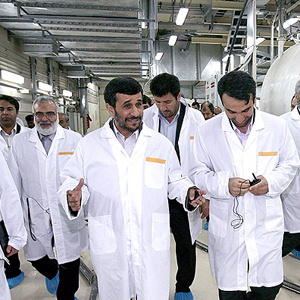Time for West to Decide
Giving Iran high-enriched uranium of forcing the country produce it itself? By Ali Khorram, foreign affairs analyst

What happened to the nuclear fuel swap plan? The key topic of discussions Geneva appeared to be coherent, feasible and easily-scheduled. Within a few months, it would provide Iran with the fuel rods needed for maintaining Tehran research reactors activities. Five plus One has to make a critical decision now. If it refuses to provide Iran with the fuel, Iran has no other way than to roll up shirt-sleeves and start producing the fuel inside.
Is Iran capable of enriching uranium to a high grade? The answer is yes. But this could be a lengthy process needing a year-long period to bear fruit. Moreover, occupation with production of high-grade uranium could divert Iran’s focus from its prime objective, which is increasing the number of centrifuges and adding to its bulk of 3.5 percent enriched uranium.
The best scenario for Iran could be receiving fuel from Western countries without having to pay the diplomatic price. However, an answer of no would force the country to embark on the enrichment process, even if that means spending several years on the project. Initiating high uranium enrichment, Iran will cross the Rubicon and that will ring the alarm bells for West, with a sound so high that could push them into frenzy. It is for the benefit of West to provide Iran with the higher-grade enriched uranium it needs, so that Iran would continue with commercial enrichment. Otherwise, Western powers should embrace the consequences.
There was no hesitation among decision-makers in Iran to announce that they’re ready to embark on high uranium enrichment. This massive step will not keep the negotiations immune from the impact however. Ahmadinejad’s remarks have now thrown the ball in the Western court: Now Tehran can wield the enrichment know-how as a bargaining chip to force West supply the nuclear fuel. With West’s positive response, Iran would follow the current procedure, but a negative response means it has to focus its efforts on production of 20 percent enriched uranium which is of course a lengthy process. But Tehran has shown it is ready to pay the price for its nuclear program.
Is Iran capable of enriching uranium to a high grade? The answer is yes. But this could be a lengthy process needing a year-long period to bear fruit. Moreover, occupation with production of high-grade uranium could divert Iran’s focus from its prime objective, which is increasing the number of centrifuges and adding to its bulk of 3.5 percent enriched uranium.
The best scenario for Iran could be receiving fuel from Western countries without having to pay the diplomatic price. However, an answer of no would force the country to embark on the enrichment process, even if that means spending several years on the project. Initiating high uranium enrichment, Iran will cross the Rubicon and that will ring the alarm bells for West, with a sound so high that could push them into frenzy. It is for the benefit of West to provide Iran with the higher-grade enriched uranium it needs, so that Iran would continue with commercial enrichment. Otherwise, Western powers should embrace the consequences.
There was no hesitation among decision-makers in Iran to announce that they’re ready to embark on high uranium enrichment. This massive step will not keep the negotiations immune from the impact however. Ahmadinejad’s remarks have now thrown the ball in the Western court: Now Tehran can wield the enrichment know-how as a bargaining chip to force West supply the nuclear fuel. With West’s positive response, Iran would follow the current procedure, but a negative response means it has to focus its efforts on production of 20 percent enriched uranium which is of course a lengthy process. But Tehran has shown it is ready to pay the price for its nuclear program.

